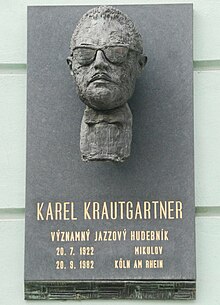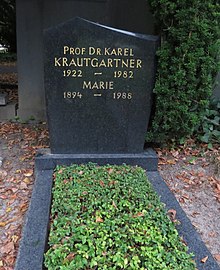Karel Krautgartner
Karel Krautgartner (* 20th July 1922 in Mikulov , German Mikulov , Moravia , Czechoslovakia ; † 20th September 1982 in Cologne ) was a Czech jazz - clarinetist , saxophonist , composer and orchestra leader who had a formative influence on the Czech jazz.
Life
Karel Krautgartner, whose father was a post office worker, began playing the piano when he was eight. After the family moved to Brno , he became interested in jazz , which he heard on the radio. He took private clarinet lessons and in 1936 formed a student band. In 1938 he became a professional musician and from 1942 to 1943 he played the saxophone in the orchestra of Gustav Brom in the Hotelpassage in Brno. He then founded the “Dixie Club” orchestra during the time of the German occupation , for which he arranged in the style of swing music by Benny Goodman and Glenn Miller . In 1945 he moved to Prague with many orchestra members , where they became part of Karel Vlach's orchestra . He remained in this orchestra until 1955 as head of the saxophone section. He also composed and arranged for the orchestra.
In 1956 he and Karel Velebný founded the "Karel Krautgartner Quintet", which accompanied Karel Gott , played swing and Dixieland jazz and had its headquarters in the Prague Cafe Vltava (Revolucni Street). Because he refused to cooperate with the secret service , obstacles were placed in the way of him and his orchestra when traveling abroad. When he was refused exit at the Prague airport at the last moment , he broke up the band.
From 1958 to 1961 he played simultaneously in the style of West Coast jazz with his "All Star Band" and traditional jazz with his "Studio 5" band, with which he won first prize for small bands at the 7th World Youth Festival in Vienna in 1959 . From 1960 to 1968 he was director of the dance orchestra of the Czechoslovak Radio , which operated as a jazz orchestra from 1963 and was renamed "Karel Krautgartner Orchester" in 1967. Stan Kenton was the model here . He performed with the orchestra in 1964 at the jazz festival in Munich and in 1964 and 1965 at the one in Prague. In 1968 he made recordings with Kurt Edelhagen's orchestra in Cologne.
After the occupation of the ČSSR in 1968, Krautgartner, who was also politically active in the Prague Spring , went into exile with his family. In Vienna he led the later ORF Big Band , while his friend Paul Polansky became the music director of Ö3 . In the 1970s he went to Cologne , where in 1971 he founded the seminar for popular music at the Rheinische Musikschule , received his doctorate and, as a professor at the Musikhochschule, prepared the establishment of the jazz course. In the meantime, efforts were made in Czechoslovakia to remove all traces of his work and the recordings in the radio archive were deleted.
Krautgartner died in 1982 at the age of 60 and was buried in the Melaten cemetery in Cologne (corridor R4 no. 124).
literature
- Carlo Bohländer , Karl Heinz Holler, Christian Pfarr: Reclam's Jazz Guide . 3rd, revised and expanded edition. Reclam, Stuttgart 1989, ISBN 3-15-010355-X .
- Peter Wende: Czech legends: Gustav Brom, Karel Krautgartner, Vlasta Pruchova, Karel Vlach. In: Jazz Podium , May 2008
Web links
- Official Website - Karel Krautgartner (Czech)
- Till Janzer: The jazz virtuoso whom the communists wanted to make forgotten. In: Radio Praha . October 6, 2007 .
- Antonín Matzner: Karel Krautgartner: Jazzman, který měl být zapomenut. In: czsk.net. (Czech).
- Lubomír Dorůžka : Karel Krautgartner - Jeden z osudů českého jazzu. In: časopis harmony. June 4, 2002 (Czech).
- Karel Krautgartner at Discogs (English)
| personal data | |
|---|---|
| SURNAME | Krautgartner, Karel |
| BRIEF DESCRIPTION | Czech jazz musician |
| DATE OF BIRTH | July 20, 1922 |
| PLACE OF BIRTH | Mikulov , Moravia , Czechoslovakia |
| DATE OF DEATH | 20th September 1982 |
| Place of death | Cologne |

